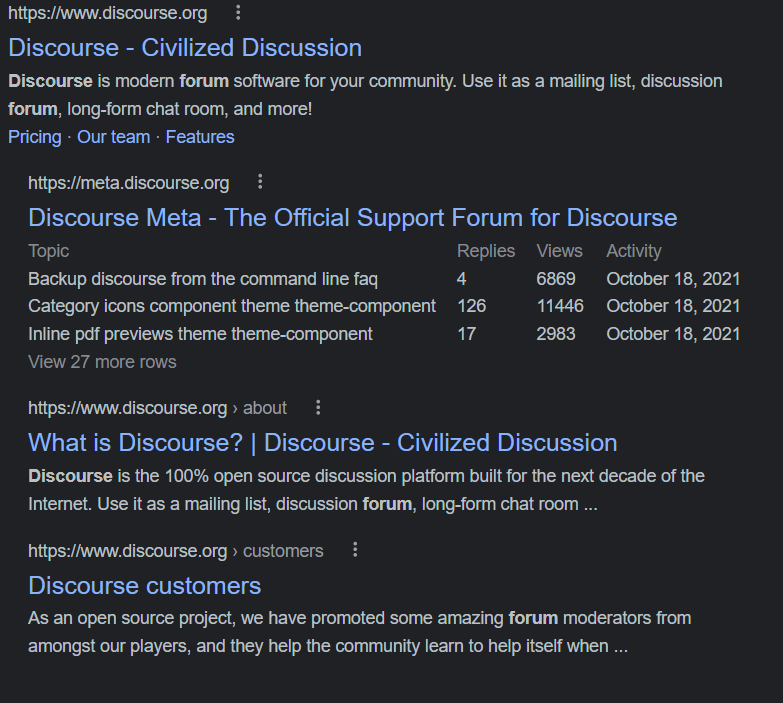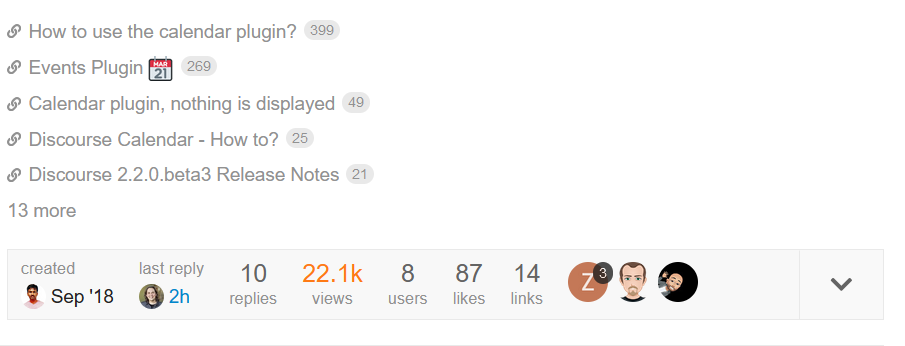Eight Tips to Improve Your Community's SEO

Helping people find your community takes time and patience. It also takes a little knowledge about search engines, how they work, and how people locate your community through them.
In this article, we’re going to demystify the basics of SEO and how you can optimize your community for discovery. We’ll discuss:
- What SEO is (and isn’t)
- Four Main Aspects of SEO
- Why SEO is Important for Your Community
- Our Top 8 SEO Tips for Forums
Ready? Let’s go!
What SEO is (and isn’t)
Search engine optimization, also known as SEO (because everything needs a good acronym, right?), is the process of improving a website so users can find it more easily through searching on the likes of Google, Bing, DuckDuckGo, and so forth. SEO can range from solving technical issues such as broken links or missing page tags all the way to analyzing keywords and crafting helpful, valuable content.
Before we go any further, let’s talk about an elephant in the room: what SEO isn't. The honest truth is there are a number of incorrect beliefs about what SEO involves still circulating in 2021. Some of these ideas originate from the reality of how search engines used to operate over a decade ago. Some of them are simply snake oil peddled to businesses to get them to spend thousands of dollars supposedly improving their search rankings.
Tactics like duplicating content across different sites, keyword stuffing, and adding invisible text on the page may seem tempting to try as a shortcut to boost rankings, but don’t do it. They’ll destroy your site’s search rankings. Additionally, by overly focusing on tiny details like editing meta tags while ignoring the major aspects of a search engine’s ranking algorithm, you’ll find lower rankings and lots of wasted time and money. Handling the small details are important at some level, but as with anything, getting the fundamentals correct first is most important.
Four Main Aspects of SEO
While the actual algorithms driving search engines are proprietary and therefore essentially a black box to us community managers and site admins, the overall behavior of search engines in relation to SEO is relatively well known. There are four main aspects search engines like Google take into account when ranking your forum’s pages. They are relevance, quality, authority, and technical. Let’s take a look at each of these in specific.
Relevance
If there’s one thing you can take away from this article, it’s that relevance is king. Google and other search engines’ main job is to do one thing: surface links to information that matches the intention of what the searcher is looking for. Think about it, if you were searching for “gluten-free pancake recipe” would you want to be shown recipes for Coq au Vin? News articles on the biggest pancake ever made? Or (a more likely scenario) pancakes made with gluten-filled flour? Absolutely not -- you want to make gluten-free pancakes! It’s a frustrating experience not to find what you’re looking for, which is why search engines do their best to try to guess what you’re trying to find.
How does this matter from a site owner’s perspective? If your content matches up with the search engine’s guess of what the searcher’s intent is, it will rank more highly. We’ll talk about this more in a minute.
Quality
Relevance and the quality of your content are highly related. But what does quality of content mean? Creating quality content means:
- Delivering on promises -- Put simply, do what you say you’re going to do. If you indicate in the title you’ll show a visitor how to make a friendship bracelet, don’t just talk about how awesome friendship bracelets are.
- Providing value -- Does the discussion, writing, or video found on the page provide valuable information to those visiting it? If a forum has discussions that are endless replies of “I agree!”, “+1+1+1+1”, or “Duh”, that isn’t a very valuable experience for someone reading the topic.
- Giving a usable experience -- When someone visits your site, can they quickly, easily get to the information they want, or did you send them to popup hell? On the modern internet, it can be easy to go overboard with popups, confirmations, and advertisements, but all of these things can actually demote your ranking if there are too many.
Authority
How does a search engine know one page better fits a searcher’s intent than another? One way is by how sites link to it. Back in ye olden days on the web when blogs reigned supreme, it was common practice if you found something of value to link it on your blog and write a blurb of thoughts about it. Posting a link to another website creates what’s affectionately known as a backlink.
As Google crawls websites, it finds these backlinks to your site and factors them into its ranking algorithm. If these links come from sites it already sees as highly authoritative, those links will boost your authority. You can probably guess, though, that not all backlinks are created equal. Low quality links either won’t improve your ranking at all or can hurt it.
Technical
While the majority of SEO is related to the actual content of the discussions and pages you host, there are technical aspects of optimizing that are important to consider as well. Can search engine crawlers reach your site? Is your site usable for mobile visitors? How fast is the site’s loading time? Is there any structure to your site’s content? Do pages you’ve moved properly redirect to the new location? Keeping tabs on these technical aspects of SEO can help you fix problems and prevent them from arising in the future.
Why SEO is Important for Your Community

You might be thinking this all sounds fine and dandy for some up-and-coming blog or news organization and wondering why this is important for your community. Well, let me tell you -- search engine optimization does not a community make. SEO is an aspect of building anything in the world online, so it’s important to be aware of it.
That being said, you can choose to go as deep as you want in using SEO as a strategy for growing your community. For example, if you run a community for technology enthusiasts, you may find new visitors by creating a discussion about a specific software tool your community is interested in. If the content shared is helpful and visitors are interested in it, the increased domain ranking can bring in quite a few visitors. It’s then your job to build ways to onboard those potential new members to be contributors to your community!
Our Top 8 SEO Tips for Forums
That all being said, how do you execute on it for a community? We have eight tips to help you get started.
1. Start truly helpful discussions
With the quality and relevance of your site’s discussion content as top priority in the eyes of search engines, the best way to improve your site’s SEO is to start, moderate, and curate valuable discussions. This can range from user-to-user support, asking and answering questions, or sharing thoughts on a relevant topic to stimulate conversation.
If a conversation is a match for a user’s search intent, it’ll increase the click-through rate from the search engine results page (SERP) and the chances someone will link to your forum in a natural way.
2. Ensure your platform is designed for usability

Not all forum platforms are created equally! The most important factors when choosing a platform in relation to SEO include user experience on both desktop and mobile devices, readability of discussion content, and speed. Discourse has made all three of these factors core to how our forums are built -- not just for SEO purposes but because they make for an overall better user experience for everyone using the platform.
3. Use topic titles to your advantage
If you’re using Discourse, the obvious place to focus on SEO for your content is the actual post content itself. However, if you need another way to target both your URL and title toward a specific keyword or action, edit the topic title. The title is used to generate both the on-page title and the URL of the page. Oftentimes targeted keywords are found in the URL slug, so editing the topic title can be a helpful way to hone SEO for certain topics on the site.
Editing topic titles is something every community leader should be doing. We recommend adding it to your community’s terms of service and make a habit of clarifying titles, both for SEO purposes and the mere fact of properly understanding what’s discussed in a topic. You may have community members who complain about moderators appearing to randomly edit their topic titles. The explanation is simple: you get better responses if the title accurately reflects the discussion or questions at hand.
4. View SEO as long-term investment
It’s easy to fall into the trap of thinking if you get all the little details of SEO correct that your site will start to rank higher in Google right away. This is definitely not the case. Building authority with a search engine takes time, and even the final rankings of a page can take months to solidify after a new discussion is created. Optimizing your site for search is a long game that can pay off if done patiently and thoughtfully, and taking shortcuts to try to speed up the process can damage your rankings more than help them.
5. Don’t be afraid to promote your community

If you build it, they will come.
Building authority takes time, and it also requires other people to know about it! You might find yourself with the mindset of, “If you build it, they will come.” Sometimes this works, but it’s also okay to promote your project. Start by sharing links on your social media platform of choice, but be aware these often don’t build authority with search engines as they’re marked with a nofollow tag. This means search crawlers will not follow these links and count them toward the authoritativeness of the page.
Another approach is to find partners in the same or similar niche as you and share links to each other’s resources or discussions. While this can take some time and effort, it’s also a way to build your community into being seen as a trusted resource.
6. Link discussions together

In addition to backlinks, search engines also take internal linking into account. What this means for discussion boards is to link existing conversations together. If one topic is related to another one, be sure to post a link in one of them. If you’re using Discourse, a backlink is automatically created on the page to the post where it’s linked. These links help visitors find related discussions, and also can increase the likelihood they will join and contribute as well.
7. Research keywords for important discussions you’re seeding
Seeding discussion is an important part of starting any community. Nobody wants to join a ghost town, right? One tactic to employ when seeding this content is researching relevant keywords to target. You can use a paid tool like Ahrefs, SEMrush, or Moz to dig into the keywords other sites are targeting, or you could use a free tool like Google Trends to find out what people may be searching for. The point here is to try to target topics those interested in your niche will be looking for. Don’t forget to write the content in a way that starts a discussion while also providing valuable information to any visitors.
8. Experiment
SEO can be seen as quite formulaic -- if you do X then you’ll get Y as a result. This is somewhat true, but there’s really only one way to find out what works and what doesn’t: experimentation. To run an experiment, try picking a keyword or topic area, sharing something helpful about it while keeping the ideas of SEO in mind, and measure the results. With each experiment, you’ll learn more about what works, what doesn’t, and how you can directly help your community’s target audience.
No need to worry about SEO
Yes, really. While SEO is an important part of building any presence online, it’s nothing to obsess or worry about. If there are technical issues with your forum’s SEO, seek to fix them. If there’s a keyword you want to target or a discussion you notice is getting a lot of organic search traffic, experiment with it to see if you can draw people deeper into your community with it.
Remember, creating a community is all about cultivating relationships with those who join it. SEO is one way to help bring more people into your community, the bulk of the work is still building connections and taking care of its members.
